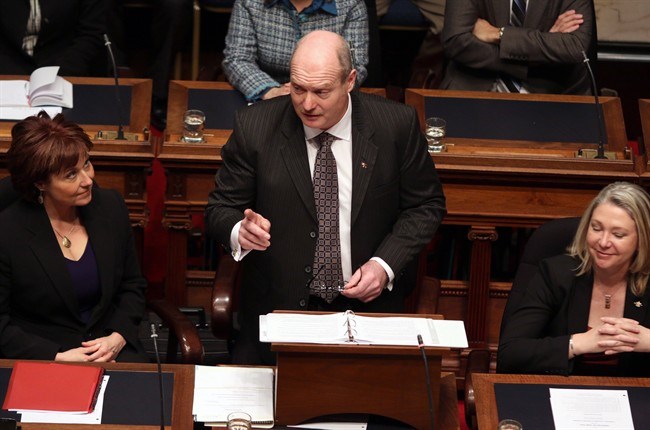 There won’t be any apologies from the B.C. Liberals any time soon for the fundamental decision in the budget — to make the balance sheet the top priority.
There won’t be any apologies from the B.C. Liberals any time soon for the fundamental decision in the budget — to make the balance sheet the top priority.
There were some routine increases in program spending and some new benefits will be flowing this year to families.
But the main thrust of the $890-million-surplus budget this year is aimed at one specific component of the provincial debt. The B.C. Liberals ran four consecutive years of deficit budgets after the economic meltdown in 2008. That amounts to about $5 billion worth of debt and Finance Minister Mike de Jong wants to reduce that as much as possible.
Speaking to the Victoria Chamber of Commerce Wednesday, he said the global landscape is strewn with governments who got very good at borrowing money to cope with the recession, but aren’t very good at paying it back.
B.C. governments over the past generation have a lot more time in the red than in the black. B.C. Liberals assumed $15 billion worth of accumulated deficits when they took power in 2001. That was wrangled down to about $5.7 billion by the time the recession hit. Then it jumped back up to $10 billion by the time deficit financing ended in 2013.
One of the key targets in the three-year plan is to wrangle it back down below $5 billion in three years, which would make for the lowest operating debt since 1991.
The overall debt continues to rise, but the Liberals have never shown too much concern about borrowing for infrastructure spending. Total debt will go from $63 billion to $70 billion in the next three years. The government is counting a reduction in the growth rate as a win.
So the breathing room won’t be used to relax much in the way of fee reductions or strict budgeting requirements.
De Jong pleaded guilty before the luncheon crowd to the charge of demanding B.C. school boards come up with $29 million in savings. It’s a fractional amount of their total annual budgets, but it’s being contested by boards who already feel cut to the bone.
“You’ve got two school boards operating side by side,” he said. “Do they both need a payroll department? Maybe. But maybe not.”
He entered another guilty plea to the charge of increasing MSP premiums. After 20 years in politics, he said he still can’t find “the magic money tree” that would fund programs. So premiums will go up four per cent next January, to $75 for a single and $150 for a family of three or more.
“It’s publicly funded health care. It ain’t free,” he said.
Attacked later in the afternoon in the legislature about the MSP hike, de Jong said premiums are waived for a million citizens and another 800,000 pay reduced premiums.
The government appears sensitive to charges it gave the rich a break and didn’t do enough for low-income earners.
“There is this perception that there is nothing to assist people at lower income levels,” de Jong said.
So he included in the budget documents an outline of programs for low-income earners. A couple with two pre-schoolers at $30,000 a year is eligible for $11,000 in government programs (most of the money comes from the federal government).
De Jong also tried to counter a concerted attack by the NDP on the expiration of a surtax on high-income earners. It was introduced two years ago for a two-year period and will expire on schedule, costing the government more than $200 million a year in forgone revenue.
The Opposition has seized on that as a tax break for what NDP Leader John Horgan on Wednesday called “the champagne and caviar set.”
But de Jong said the NDP ridiculed and opposed the extra tax in 2013, and are now opposed to eliminating it.
“We are unapologetic for the fact that we have sought to achieve the most competitive tax framework in all of Canada,” he said.
Pleading guilty to fee hikes and cost-cutting and unapologetic about keeping taxes low. That will be the stance over the next three months as the budget gets scrutinized and passed.



